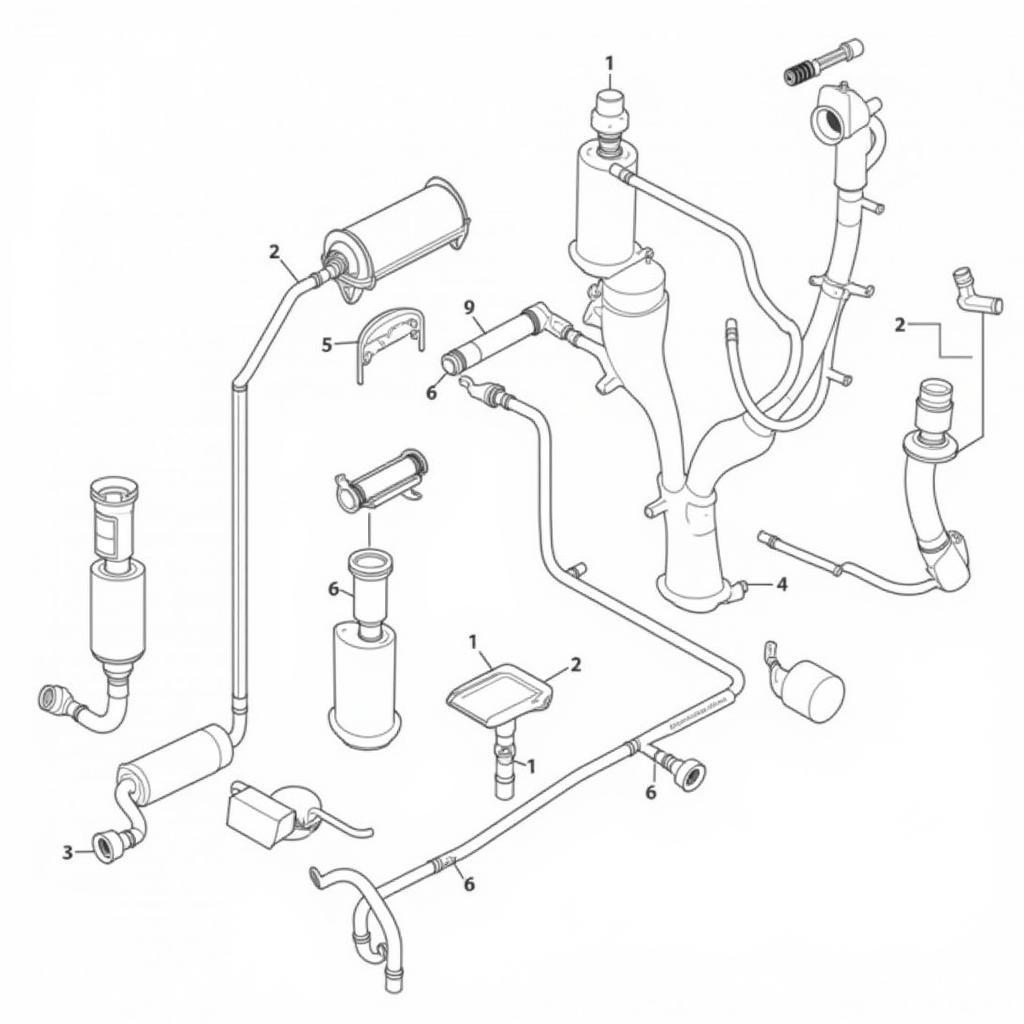The iconic growl of a 2008 BMW M3 is instantly recognizable. This article delves into the specifics of the 2008 BMW M3 exhaust sound, covering everything from its distinct characteristics to common problems and potential upgrades. We’ll explore why the exhaust note is so beloved by enthusiasts and provide valuable insights for owners, mechanics, and technicians alike.
 2008 BMW M3 Exhaust System Diagram
2008 BMW M3 Exhaust System Diagram
Understanding the 2008 BMW M3’s Unique Sound
The 2008 BMW M3’s exhaust note is a product of its high-revving, naturally aspirated V8 engine. Unlike turbocharged engines, which often have a more muted sound, the S65 V8 produces a raw, visceral scream as it climbs towards its 8,400 RPM redline. This distinct sound signature is a significant part of the M3’s appeal. The exhaust system itself, designed for optimal flow and performance, plays a crucial role in shaping this iconic sound. It’s a blend of mechanical precision and acoustic engineering, resulting in a symphony of power and performance.
Common Exhaust Issues in the 2008 BMW M3
While the 2008 BMW M3’s exhaust system is generally robust, certain issues can arise. These can include exhaust leaks, which can manifest as a hissing or ticking sound, and can affect performance and emissions. Another potential problem is a failing catalytic converter, often indicated by a rattling sound or a check engine light. Regular maintenance and inspections are vital for addressing these issues promptly. Ignoring these problems can lead to more costly repairs down the line.
Modifying the 2008 BMW M3 Exhaust Sound
Many owners choose to modify their 2008 BMW M3 exhaust system to further enhance the sound or improve performance. Aftermarket exhaust systems, including cat-back systems, axle-back systems, and headers, offer various options for customizing the exhaust note. These modifications can range from subtle refinements to aggressive roars, depending on the chosen components. However, it’s essential to choose high-quality components and ensure proper installation to avoid potential problems.
How Can I Diagnose an Exhaust Leak on My 2008 BMW M3?
Exhaust leaks often present themselves with a hissing or ticking sound, particularly when the engine is cold. You can sometimes pinpoint the leak by carefully inspecting the exhaust system for any visible damage or signs of soot buildup.
What are the Benefits of Upgrading to an Aftermarket Exhaust System?
Besides enhancing the sound, aftermarket exhaust systems can often improve performance by reducing backpressure and optimizing exhaust flow. This can lead to slight gains in horsepower and torque.
Why is My 2008 BMW M3 Exhaust So Loud?
The 2008 BMW M3’s exhaust is designed to produce a sporty and aggressive sound, reflective of its high-performance nature. However, excessive loudness could indicate an issue like an exhaust leak or a modified exhaust system.
Is it Legal to Modify My 2008 BMW M3 Exhaust?
Exhaust modifications are subject to local regulations regarding noise levels and emissions. It’s crucial to research and comply with these regulations to avoid potential fines.
What is the Average Cost of Replacing the Exhaust System on a 2008 BMW M3?
The cost of replacing the entire exhaust system on a 2008 BMW M3 can vary significantly depending on the chosen components and labor rates. However, expect to spend a considerable amount for a complete system replacement.
“A well-maintained exhaust system is crucial not only for the signature sound but also for the overall performance and longevity of the 2008 BMW M3,” says Michael Stevens, a veteran BMW technician with over 20 years of experience. “Regular inspections are key to catching potential issues early.”
How Often Should I Have My 2008 BMW M3 Exhaust Inspected?
It’s recommended to have your exhaust system inspected at least once a year or as part of your regular vehicle maintenance schedule. “Addressing any exhaust problems promptly can prevent further damage and ensure your M3 continues to deliver its thrilling performance,” adds Stevens.
In conclusion, the 2008 BMW M3 exhaust sound is a key element of its character. Understanding its nuances, potential problems, and modification options allows owners and technicians to appreciate and maintain this iconic vehicle’s unique auditory signature. By addressing issues proactively and considering upgrades thoughtfully, you can ensure your 2008 BMW M3 continues to deliver its exhilarating driving experience for years to come.
FAQ
- What causes a rattling sound from my exhaust? A rattling sound could indicate a loose heat shield or a failing catalytic converter.
- How can I make my 2008 BMW M3 exhaust louder? Aftermarket exhaust systems offer various options for increasing volume.
- What are the signs of a clogged catalytic converter? Reduced engine performance, a sulfur-like smell, or a check engine light can indicate a clogged catalytic converter.
- Can I install an exhaust system myself? While possible, professional installation is recommended for optimal fit and performance.
- What is a cat-back exhaust system? A cat-back system replaces the exhaust components from the catalytic converter back.
- How does the exhaust system impact engine performance? The exhaust system plays a role in managing backpressure, which can affect engine efficiency and power output.
- What are some reputable brands for BMW M3 exhaust systems? Several reputable brands specialize in performance exhaust systems for BMW M3s, offering various options to suit different preferences and budgets.
Need help with your BMW? Contact us via Whatsapp: +1 (641) 206-8880, Email: CARDIAGTECH[email protected] or visit us at 276 Reock St, City of Orange, NJ 07050, United States. We offer 24/7 customer support.
